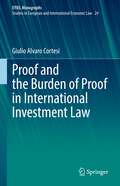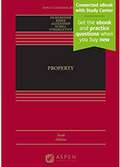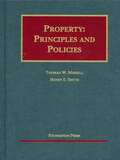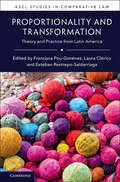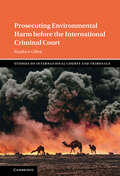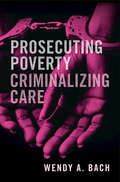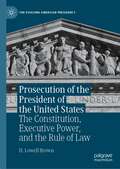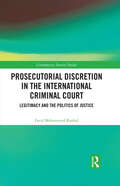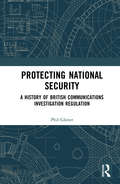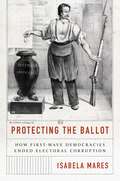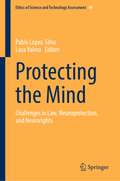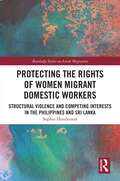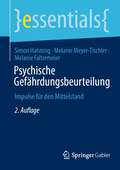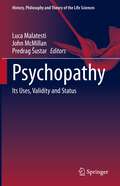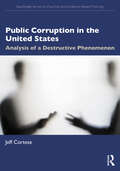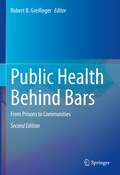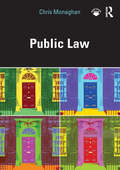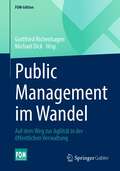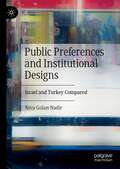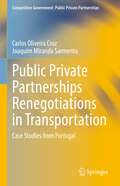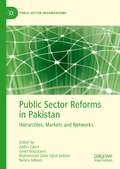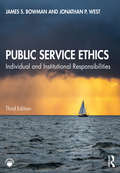- Table View
- List View
Proof and the Burden of Proof in International Investment Law (European Yearbook of International Economic Law #24)
by Giulio Alvaro CortesiInternational investment arbitration has been dubbed the “Antarctica” of international procedural law. This book explores international investment arbitration (IIA) using the searchlight of comparative analysis. Further, it provides answers to several questions, such as the role of ICJ judgments and WTO decisions as a source of inspiration for how proof and the burden of proof are approached in IIA. By investigating various evidence-related issues, the book also sheds light on overarching questions including the role of IIA as a subsystem of international economic law.
Property (Aspen Casebook Ser.)
by Lior Jacob Strahilevitz Gregory S. Alexander Jesse Dukeminier Michael H. Schill James E. KrierJesse Dukeminier’s trademark wit, passion, and human interest perspective has made Property, now in its Tenth Edition, one of the best—and best loved—casebooks of all time. A unique blend of authority and good humor, you’ll find a moveable feast of visual interest, compelling cases, and timely coverage of contemporary issues. In the Tenth Edition, the authors have created a thoughtful and thorough revision, true to the spirit of the classic Property text.
Property Law: Rules, Policies, And Practices (Aspen Casebook Series)
by Joseph William Singer Nestor M. Davidson Bethany R. Berger Eduardo Moises PenalverThis hugely successful materials-and-problems book is acclaimed for its textual clarity, evenhanded perspective, and contemporary, up-to-date character. Easily distinguished from other property casebooks for its plain-language descriptions of legal doctrine; explanations of the social ramifications of our system of property law; emphasis on statutory and regulatory interpretation; comprehensive treatment of public accommodations and fair housing law, tribal property issues, and property in human bodies; and use of the problem method to teach legal reasoning and lawyering skills. Streamlined for more accessible teaching, the Eighth Edition has been thoroughly updated to reflect significant changes in the law of property, including in responses to the Covid-19 pandemic, in intellectual property, housing discrimination, regulatory takings, and more.
Property: Principles And Policies
by Maureen Brady Henry Smith Thomas MerrillThis revised casebook is designed for a “building block” property course that serves as a student’s foundation for the rest of law school and beyond. Avoiding the typical hodge-podge of issues, the book presents material in an integrated way, exploring how owner sovereignty and its limits, community values, and societal purposes are or are not realized in the structures of property law and institutions. Using vivid cases, both old and new, timely issues in intellectual property, land use, and regulatory takings are given expansive treatment, as well as traditional topics like custom, equity, and restitution. The emphasis throughout is on fundamental principles and policy questions.
Proportionality and Transformation: Theory and Practice from Latin America (ASCL Studies in Comparative Law)
by Francisca Pou-Giménez Laura Clérico Esteban Restrepo-SaldarriagaThis is the first book on proportionality in Latin American constitutional law. Leading scholars in the region explore how proportionality analysis has become a key part of the constitutional law of a region where, almost paradoxically, constitutions with clear transformative intentions coexist with the highest indicators of social inequality in the world. In this book, scholars, practitioners and students will find a fascinating account of how proportionality has been a central concept in Latin America's constitutional struggles to curtail excessive uses of state power. The book illustrates how, more recently, proportionality has played an important role in national processes of constitutionalization and transitional justice, and how its current uses in the domain of social rights endow it with a distinctive meaning and role in regional constitutionalism. This pioneering book opens up the space for a much needed global conversation on how Latin America has decisively contributed to comparative constitutional law.
Prosecuting Environmental Harm before the International Criminal Court (Studies on International Courts and Tribunals)
by Matthew GillettThe threat of anthropocentric environmental harm grows more pressing each year. Around the world, human activities are devastating the natural environment and contributing to potentially irreversible climate change. This book explores the ways in which the International Criminal Court may effectively prosecute those who cause or contribute to serious environmental destruction. Written by an international lawyer who has prosecuted cases of war crimes, crimes against humanity, and genocide, it provides insights into the procedures, laws, and techniques capable of leading to convictions against those who harm the environment.
Prosecuting Poverty, Criminalizing Care
by Wendy A. BachAt the height of the opiate epidemic, Tennessee lawmakers made it a crime for a pregnant woman to transmit narcotics to a fetus. They promised that charging new mothers with this crime would help them receive the treatment and support they often desperately need. In Prosecuting Poverty, Criminalizing Care, Wendy Bach describes the law's actual effect through meticulous examination of the cases of 120 women who were prosecuted for this crime. Drawing on quantitative and qualitative data, Bach demonstrates that both prosecuting 'fetal assault', and institutionalizing the all-too-common idea that criminalization is a road to care, lead at best to clinically dangerous and corrupt treatment, and at worst, and far more often, to an insidious smokescreen obscuring harsh punishment. Urgent, instructive, and humane, this retelling demands we stop criminalizing care and instead move towards robust and respectful systems that meet the real needs of families in poor communities.
Prosecution of the President of the United States: The Constitution, Executive Power, and the Rule of Law (The Evolving American Presidency)
by H. Lowell BrownThis book provides a detailed look at the constitutional, historical, and political arguments concerning presidential immunity from prosecution, as well as the opinions of the Office of Legal Counsel that provided the justification for the decision not to prosecute President Trump. Focusing on those opinions, the book examines the constitutional basis of presidential immunity, both textual and historical, as reflected in the deliberations of the 1787 Convention and the ratification debates. The opinions are viewed in the context of the criminal investigations of Presidents Nixon and Clinton that gave rise to those opinions, as well as the pronouncements of the Supreme Court concerning their claims, and those of President Trump to immunity from judicial inquiry. Lastly, the book analyzes presidential immunity in light of the separation of powers, the availability of impeachment, and the discordance between presidential immunity and the rule of law.
Prosecutorial Discretion in the International Criminal Court: Legitimacy and the Politics of Justice (Contemporary Security Studies)
by Farid Mohammed RashidThis book provides the first scholarly investigation of prosecutorial discretion in the International Criminal Court (ICC) from an interdisciplinary perspective. This work analyses the discretionary power of the ICC prosecutor and its scope. It explains that there is a tendency to overlook the necessity of distinguishing between the various usages of discretion when exercised as a power authorised by the law and effect when applying indeterminate legal thresholds. The author argues that the latter indeterminacy may give decision makers an unwarranted opportunity to exercise a wide range of discretion, where extra-legal factors may be considered. In comparison, prosecutorial discretion allows decision makers to consider extra-legal considerations. This book also discusses the relevance of political considerations within the decision-making process in the context of the exercise of prosecutorial discretion. It suggests that there need not be a conflict between the broad sense of justice as outlined in the Statute and political factors in giving effect to decisions. This book will be of interest to students of international law, global governance and international relations.
Protecting National Security: A History of British Communications Investigation Regulation
by Phil GloverThis book contends that modern concerns surrounding the UK State’s investigation of communications (and, more recently, data), whether at rest or in transit, are in fact nothing new. It evidences how, whether using common law, the Royal Prerogative, or statutes to provide a lawful basis for a state practice traceable to at least 1324, the underlying policy rationale has always been that first publicly articulated in Cromwell’s initial Postage Act 1657, namely the protection of British ‘national security’, broadly construed. It further illustrates how developments in communications technology led to Executive assumptions of relevant investigatory powers, administered in conditions of relative secrecy. In demonstrating the key role played throughout history by communications service providers, the book also charts how the evolution of the UK Intelligence Community, entry into the ‘UKUSA’ communications intelligence-sharing agreement 1946, and intelligence community advocacy all significantly influenced the era of arguably disingenuous statutory governance of communications investigation between 1984 and 2016. The book illustrates how the 2013 ‘Intelligence Shock’ triggered by publication of Edward Snowden’s unauthorized disclosures impelled a transition from Executive secrecy and statutory disingenuousness to a more consultative, candid Executive and a policy of ‘transparent secrecy’, now reflected in the Investigatory Powers Act 2016. What the book ultimately demonstrates is that this latest comprehensive statute, whilst welcome for its candour, represents only the latest manifestation of the British state’s policy of ensuring protection of national security by granting powers enabling investigative access to communications and data, in transit or at rest, irrespective of location.
Protecting the Ballot: How First-Wave Democracies Ended Electoral Corruption
by Isabela MaresHow reforms limiting electoral misconduct completed the process of democratizationBetween 1850 and 1918, many first-wave democracies in Europe adopted electoral reforms that reduced the incidence of electoral malfeasance. Drawing on analysis of parliamentary deliberations and roll-call votes in France, Germany, Belgium, and the United Kingdom, Protecting the Ballot explores how these electoral changes came about.Reforms limiting electoral malfeasance came in a variety of forms. Some reforms imposed harsher punishments for bribing or the politicization of state resources during campaigns. Other changes improved electoral secrecy, providing better protection of voters’ autonomy. By mandating the presence of candidate representatives supervising electoral operations, reforms also reduced the incidence of electoral fraud. Isabela Mares documents how elite splits facilitated the formation of parliamentary majorities in support of electoral reforms. The political composition of these majorities varied across countries and across issue area, depending on the distribution of political resources and the economic and electoral costs incurred by politicians with opportunities to engage in malfeasance. Unpacking the electoral determinants of the demand for reforms, Mares offers an alternative to theories of democratization that emphasize economic considerations alone.By studying the successful adoption of reforms limiting electoral irregularities in first-wave democratic transitions, Protecting the Ballot sheds light on the opportunities and obstacles for ending electoral wrongdoing in recent democracies.
Protecting the Mind: Challenges in Law, Neuroprotection, and Neurorights (Ethics of Science and Technology Assessment #49)
by Luca Valera Pablo López-SilvaThis book offers a comprehensive analysis of philosophical, social, ethical, and legal challenges arising as a consequences of current advances in neurosciences and neurotechnology. It starts by offering an overview of fundamental concepts such as mental privacy, personal autonomy, mental integrity, and responsibility, among others. In turn, it discusses the influence of possible misuses or uncontrolled uses of neurotechnology on those concepts, and, more in general, on human rights and equality. Then, it makes some original proposals to deal with the main ethical, legal, and social problems associated to the use of neurotechnology, both in medicine and in everyday life, suggesting possible policies to protect privacy, neural data, and intimacy. Crossing the borders between humanities, natural sciences, bio-medicine, and engineering, and taking into account geographical and cultural differences, this book offers a conceptual debate around policy and decision making concerning some of the key neuroethical challenges of our times. It offers a comprehensive guide to the most important issues of neurojustice and neuroprotection, together with a set of new paradigms to face some of the most urgent neuroethical problems of our times.
Protecting the Rights of Women Migrant Domestic Workers: Structural Violence and Competing Interests in the Philippines and Sri Lanka (Routledge Series on Asian Migration)
by Sophie HendersonMigrant women across Asia disproportionately work in precarious, insecure, and informal employment sectors that are subject to few regulations, receive low pay, and expose women to harm, of which domestic work is among the most prevalent. This book uses the cases of the Philippines and Sri Lanka to develop a comprehensive, intersectional, rights-based approach to better protect women migrant domestic workers against exploitation. As accounts of exploitation, gender-based violence, torture, and death among migrant domestic workers increase, the recognition and defence of their human and labour rights is an urgent necessity. The Philippines and Sri Lanka are two of the leading labour-sending states of women domestic workers in Asia, and their economies have become increasingly dependent on the remittances they send back home. Drawing on extensive original research, this book argues that these two sending states are guilty of structural violence by sustaining a network of institutions, policies and practices which serve to systematically disadvantage and discriminate against women migrant domestic workers. The research covers the entire migration process, from pre-departure, through to overseas employment, followed by return and reintegration. This book’s innovative application of structural violence theory as a way to investigate the role of state institutions in labour-sending countries in the Global South will be of interest to researchers from across the fields of migration studies, gender studies, human rights law, and Asian Studies.
Psychische Gefährdungsbeurteilung: Impulse für den Mittelstand (essentials)
by Simon Hahnzog Melanie Meyer-Tischler Melanie FaltermeierDieses Essential klärt über Hintergründe und Gestaltungsmöglichkeiten einer psychischen Gefährdungsbeurteilung auf und gibt praktische Impulse zur erfolgreichen Umsetzung, insbesondere in mittelständischen Unternehmen. In der vorliegenden 2. Auflage wurden die Inhalte grundlegend überarbeitet, aktualisiert und um die Erfahrungen aus acht Jahren GBpsych in zahlreichen Unternehmen ergänzt. Verantwortliche erhalten Sicherheit hinsichtlich der rechtlichen Verpflichtungen sowie relevante, praxiserprobte Handlungsempfehlungen für die erfolgreiche Gestaltung eines gesunden Unternehmens.
Psychopathy: Its Uses, Validity and Status (History, Philosophy and Theory of the Life Sciences #27)
by John McMillan Luca Malatesti Predrag ŠustarThis book explains the ethical and conceptual tensions in the use of psychopathy in different countries, including America, Canada, the UK, Croatia, Australia, and New Zealand. It offers an extensive critical analysis of how psychopathy functions within institutional and social contexts. Inside, readers will find innovative interdisciplinary analysis, written by leading international experts. The chapters explore how different countries have used this diagnosis. A central concern is whether psychopathy is a mental disorder, and this has a bearing upon whether it should be used. The book’s case studies will help readers understand the problems associated with psychopathy. Academics and students working in the philosophy of psychiatry, bioethics, and moral psychology will find it a valuable resource. In addition, it will also appeal to mental health professionals working in forensic settings, psychologists with an interest in the ethical implications of the use of psychopathy as a construct and particularly those with a research interest in it.
Public Corruption in the United States: Analysis of a Destructive Phenomenon (Routledge Series on Practical and Evidence-Based Policing)
by Jeff CortesePublic Corruption in the United States provides a comprehensive view of public corruption, including discussion on its types, methods, trends, challenges, and overall impact. It is the first book of its kind to examine in plain language the breadth of criminal public corruption in the United States, not just at a superficial level, but in a deeper context. By critically examining acts of corruption of elected, appointed and hired government officials (legislators, law enforcement, judges, etc.) at the local, state, and federal levels, the reader gains insight into the inner workings of corruption, including its relationship to terrorism and organized criminal networks. Using simple language and easy-to-understand examples, this book is about empowering investigators, compliance professionals, educators, public officials, and everyday citizens who seek to better serve, support, and protect their communities and their country.
Public Health Behind Bars: From Prisons to Communities
by Robert B. GreifingerPublic Health Behind Bars From Prisons to Communities examines the burden of illness in the growing prison population, and analyzes the impact on public health as prisoners are released. This book makes a timely case for correctional health care that is humane for those incarcerated and beneficial to the communities they reenter.
Public Health Ethics
by Stephen HollandThe study of public health aims to protect and promote the wellbeing of the public as well as reduce health inequalities. Public health ethics asks how far we should go to achieve these goals, balancing the rights and needs of individuals against those of the community. But what are these and how much weight should be given to each of them? In the third edition of his well-loved textbook, Stephen Holland shows how philosophy is key to evaluating the suitability of public health interventions. Holland explores the key goals of public health ethics in relation to both moral and political philosophy, reflecting on our everyday intuitions about which public health policies are justified. In light of recent developments, he includes new content exploring equity and health inequalities, and on how public health information is gathered and used. The book is updated throughout with material on contemporary cases, such as the COVID-19 pandemic. Public Health Ethics continues to provide a lively, accessible and philosophically informed introduction. As well as being an ideal student text, Holland&’s systematic discussion will engage the more advanced reader and inform scholarship in the field.
Public Law
by Chris MonaghanPublic Law guides students through all the essential components of the Public Law module, in a user-friendly structure that is ideal for visual learners. Written by an experienced teacher of Public Law, the book takes an accessible and engaging approach to often complex areas of law, politics and the constitution. Incorporating recent developments, academic debate and commentary, the book introduces students to all the key concepts of this core subject. The text is grounded in context, explaining how Public Law operates in practice, and it thoroughly covers the spectrum of Constitutional Law, Human Rights and Administrative Law. Integrated pedagogic features ease navigation of the text and reinforce key points. These include Public Law in Context, Recent Developments, Public Law in Practice, Practical Application and Academic Debate, and Public Law is also supported by online Multiple Choice Questions. Public Law is essential reading for modules on public law and constitutional and administrative law on LLB degrees and conversion courses.
Public Law
by Chris MonaghanPublic Law guides students through all the essential components of the Public Law module, in a user-friendly structure that is ideal for visual learners. Written by an experienced teacher of Public Law, the book takes an accessible and engaging approach to often complex areas of law, politics and the constitution. Incorporating recent developments, academic debate and commentary, the book introduces students to all the key concepts of this core subject. The text is grounded in context, explaining how Public Law operates in practice, and it thoroughly covers the spectrum of Constitutional Law, Human Rights and Administrative Law.Integrated pedagogic features ease navigation of the text and reinforce key points. These include Public Law in Context, Recent Developments, Public Law in Practice, Practical Application and Academic Debate, and Public Law is also supported by online Multiple Choice Questions. Public Law is essential reading for modules on public law and constitutional and administrative law on LLB degrees and conversion courses.
Public Management im Wandel: Auf dem Weg zur Agilität in der öffentlichen Verwaltung (FOM-Edition)
by Michael Dick Gottfried RichenhagenDie öffentliche Verwaltung steht vor der großen Herausforderung, digitaler und agiler zu werden, ohne dabei die Prinzipien der Gesetzmäßigkeit, Transparenz, Verhältnismäßigkeit und Gleichbehandlung aus den Augen zu verlieren. Disruptive Ereignisse, wie beispielsweise die Finanzkrise, Umweltereignisse, Flüchtlingsbewegungen oder Epidemien, fordern die Institutionen und Organisationen, reaktionsschnell, flexibel und wirksam zu agieren. Um auf Ereignisse dieser Art vorbereitet zu sein, sind rezeptartige Maßnahmenbündel im Stile vorgegebener Qualitätshandbücher nur bedingt geeignet. Stattdessen sind andere Arbeitsweisen, bspw. stärkere Vernetzung, interdisziplinäre Kooperation oder innovationsfördernde Projektarbeit, gefragt. Daneben besteht die Anforderung, auf der Basis rechtsstaatlicher und demokratischer Prinzipien zu agieren. Die auf diesen Grundsätzen basierenden traditionellen Arbeitsformen sind mit agilen Ansätzen zu verbinden oder zu synthetisieren, nicht aber von diesen abzulösen. Die Verwaltung muss also Flexibilität und Stabilität miteinander verknüpfen. Wie dies gelingen kann, zeigen die Autorinnen und Autoren dieses Buches.
Public Preferences and Institutional Designs: Israel and Turkey Compared
by Niva Golan-NadirThis book explores the existence of gaps between public preferences and institutional designs in democracies, and specifically cases in which such gaps are maintained for a long period of time without being challenged by the electorate. Gaps such as these can be seen in the complex relations between the state and religion in Israel and Turkey, and more specifically in their policies on marriage. This line of investigation is interesting both theoretically and empirically, as despite their poles apart policies, Israel and Turkey share a similar pattern of institutional dynamics. Existing explanations for this phenomenon suggested either civil society-based arguments or intra-institutional dynamics, as reasons for the maintenance of such gaps. This book enriches our understanding of policy dynamics in democratic systems by introducing a third line of argument, one that emphasizes the effective role state institutions play in maintaining such arrangements for long periods, often against the public will.
Public Private Partnerships Renegotiations in Transportation: Case Studies from Portugal (Competitive Government: Public Private Partnerships)
by Carlos Oliveira Cruz Joaquim Miranda SarmentoThere is a growing interest in Public-Private Partnerships (PPPs), particularly in infrastructure and public services. Under the scope of PPPs, renegotiations are becoming more relevant, as empirical evidence suggests that most PPP projects are inevitably renegotiated, i.e., the original contract needs to be adapted to new and unforeseen circumstances. Renegotiations have a substantial impact on the contract and performance of a PPP and usually represent significant costs for users and taxpayers. However, very little is known about the management and, mainly, the process of renegotiating that will, very likely, occur. This book provides a set of case-studies of PPP renegotiations in the transport sector. The authors illustrate the Portuguese experience, a country that has been using PPP extensively, particularly in transport. The case studies provide an extensive and detailed analysis on each aspect of the project and the renegotiation. What drives renegotiations? Why are some projects more renegotiated than others? What are the results? How can the performance of renegotiation processes be improved? These and other questions provide the basis for the discussions in this book. The novelty and value of the book come mainly from the extent of information available. Each case-study deals with these questions in much more detail than what is common in the case-studies approach.
Public Sector Reforms in Pakistan: Hierarchies, Markets and Networks (Public Sector Organizations)
by Geert Bouckaert Abiha Zahra Muhammad Zafar Iqbal Jadoon Nasira JabeenThis book provides a research-based analysis of public sector reforms in Pakistan. It offers a broad overview of reforms at different levels of government – including federal, provincial and local – and examines decentralization and devolution reforms in various policy sectors. It also reflects on market-oriented reforms and the steps taken to involve the private sector to build a better-governed public sector, and explores new trends in the public sector in the areas of digitalisation and disaster management. Bringing together young researchers, academics, and practitioners, the book sets a new milestone in the movement towards context-specific reform studies in both academia and the professional practice of public administration, particularly in South Asia.
Public Service Ethics: Individual and Institutional Responsibilities
by James S. Bowman Jonathan P. WestThe study and practice of ethics, in all its exemplary and execrable forms, matter now more than ever. It deals with one of the most gripping questions in life: "What is the right thing to do?" Public Service Ethics: Individual and Institutional Responsibilities, Third Edition, introduces readers to this personally relevant and professionally challenging field of study. No matter the topic—the necessity of ethics, intriguing human behavior experiments, provocative approaches to decision-making, new theories to understand ethical actions, the role of ethics codes, whistleblowing incidents, corruption exposés, and the grandeur as well as decay of morality—there is no shortage of controversy. This book discusses these issues, explains how they arise, and suggests what can be done about them. The authors make the narrative user-friendly and accessible by highlighting dilemmas, challenging readers to resolve them, and enticing them to go beyond the text to discover and confront new issues. New to this Third Edition: Exploration of fascinating and important new topics such as the Green New Deal, Black Lives Matter, oaths of office, classroom dishonesty, state corruption, the Biden administration, and the ethical challenges of the COVID-19 pandemic and response. In-depth profiles of newsworthy figures, including Michael Flynn, Alexander Vindman, Anthony Fauci, and John Lewis. All new case studies drawing on actual and hypothetical events to give students an opportunity to apply concepts and analytical frameworks. All new end-of-chapter discussion questions and exercises to encourage students to think more deeply about ethical issues. The authors' conversational writing style invites readers to annotate pages with their own ideas, experiences, comparisons, and insights, bolstering students' confidence and ultimately preparing them for the ethical problems they will face in their own careers. This lively and thorough new edition is required reading for all public administration and public policy students.
